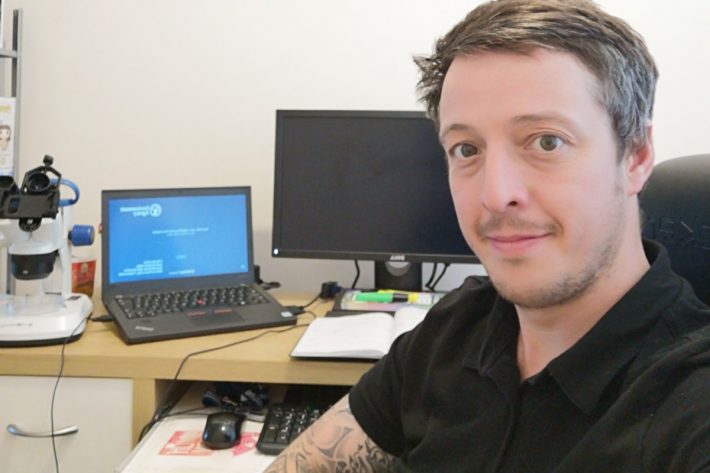Joining the pandemic response
With coronavirus hitting the UK, Arron Watson tells us why he swapped microscopes and aquatic invertebrates for a role on the incident team at the Environment Agency.

Back in March I remember being in the lab analysing our last sample for the programme year, and I started to notice many of the office workers preparing to work from home. With coronavirus hitting the UK, I asked if I should come into work the next day or work from home. That was last time I went into the office, I have been working from home since. It was all a little surreal at first, not knowing what to expect. I certainly didn’t imagine that I’d find myself in a new role within the UK government’s response to the pandemic.
I work as an aquatic entomologist and data analyst for the Environment Agency (EA), a government body which is part of the UK’s Department of Environment Food and Rural Affairs (DEFRA). Working from home, I was still able to do a large part of my Monitoring Officer job, which was fine. But I was unable to do what I love the most, which is entomology.
While the Covid-19 situation progressed fairly rapidly in the UK and globally, my mum was working in the NHS but luckily was not at high risk, both brothers were furloughed and I was keeping up to date with the good deeds and thoughtfulness of so many people around the UK on the news.
Joining the incident team
Within England, the EA is responsible for protecting and enhancing our water, land and biodiversity, regulating major industry and waste, and managing the risk of flooding as well as other activities. The agency is also a category 1 responder, along with the emergency services, local authorities and others. Our duties are varied but include a vital contribution to incident management in an emergency. It is an important part of our business and we respond to around 25,000 incidents a year.
I didn’t imagine I’d find myself in a role within the government’s response to the pandemic
Working remotely with these responsibilities, meant the agency had to think big and act early, adapting our ways of working. Our incident management teams moved quickly from planning our response to a major incident to responding to something we have never experienced before.
I received a work email asking if anyone would be interested in taking an additional or alternative role within the Covid-19 incident team at the EA. It would take precedence over other duties, meaning I’d not have much time to do my day job but I would be contributing to something very important.
I joined the EA from a background in scientific research, and a lot of the ways of working were very new to me. For example, I had spent six years learning to write academically and now I have to write for the public. But my skills matched my role, so made learning fairly straight forward.
But the Covid-19 incident role would be something completely different. It would mean having to complete tasks and solve problems which would help the EA respond in an efficient manner and prepare for things such as drought and flooding.
Playing my part
I received a presentation about how the incident role would fit into a bigger picture: our local Covid-19 incident team would feed into the national incident team, and then into DEFRA and COBRA, the UK government’s committee for responding to crises. The information we put together would help inform our government of what risks we face and how we will deal with this.
I sat back when I read the email and thought about my mum and brothers and how many people were going above and beyond to help while others could not. I decided that I would try and do my small part and try and make a difference even if it meant taking a role which I wasn’t even sure I had the skills for.
During my first few weeks, I used my initiative to try and solve tasks and help where I could. I was praised for my work and that helped me settle. I feel now that I am helping with a bigger picture, doing what I can in a difficult time.
There are days when I would love to be back in the lab and identifying aquatic invertebrates. Even with a microscope at home and my own books, I am usually too exhausted by the end of the day to attempt anything else after being on a computer five days a week (something I am not used to). However, on those dark days, I try and think of the positives and that’s people coming together to support one another and those little things which make a difference.
Support is important
I am very lucky to work for a great organisation which supports its workforce. We have regular communication with our chief executive, and strong policies on work-life balance have meant that if we are finding things difficult during this time there is someone there to support us. I think of this every time I start work and how lucky I am to be employed while others are not so fortunate.
I feel now that I am helping with a bigger picture, doing what I can in a difficult time
It’s these thoughts which drive my enthusiasm to support the incident team. I am currently on duty this week, learning new skills every day and thinking of those aquatic invertebrates I am sure I will see again one day.
My thoughts are with all those other people at home and how it may be difficult to focus sometimes: try think of the positives and stay in touch with others. We are all in this together.
Like what we stand for?
Support our mission and help develop the next generation of ecologists by donating to the British Ecological Society.